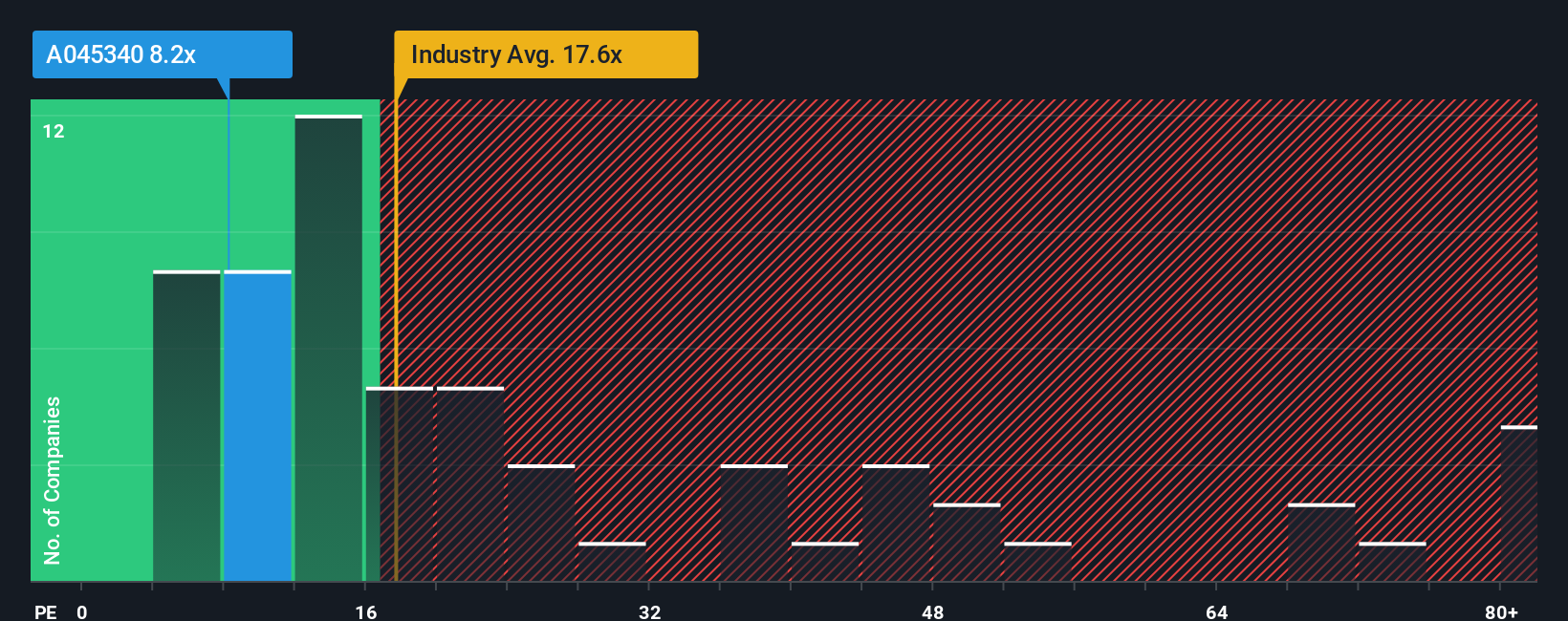- South Korea
- /
- Software
- /
- KOSDAQ:A045340
Investors Still Aren't Entirely Convinced By Total Soft Bank Ltd.'s (KOSDAQ:045340) Earnings Despite 30% Price Jump
Total Soft Bank Ltd. (KOSDAQ:045340) shares have continued their recent momentum with a 30% gain in the last month alone. The last 30 days bring the annual gain to a very sharp 94%.
Although its price has surged higher, Total Soft Bank may still be sending bullish signals at the moment with its price-to-earnings (or "P/E") ratio of 8.2x, since almost half of all companies in Korea have P/E ratios greater than 15x and even P/E's higher than 32x are not unusual. However, the P/E might be low for a reason and it requires further investigation to determine if it's justified.
With earnings growth that's exceedingly strong of late, Total Soft Bank has been doing very well. One possibility is that the P/E is low because investors think this strong earnings growth might actually underperform the broader market in the near future. If you like the company, you'd be hoping this isn't the case so that you could potentially pick up some stock while it's out of favour.
View our latest analysis for Total Soft Bank

What Are Growth Metrics Telling Us About The Low P/E?
In order to justify its P/E ratio, Total Soft Bank would need to produce sluggish growth that's trailing the market.
Retrospectively, the last year delivered an exceptional 54% gain to the company's bottom line. Pleasingly, EPS has also lifted 192% in aggregate from three years ago, thanks to the last 12 months of growth. Accordingly, shareholders would have probably welcomed those medium-term rates of earnings growth.
Comparing that to the market, which is only predicted to deliver 30% growth in the next 12 months, the company's momentum is stronger based on recent medium-term annualised earnings results.
With this information, we find it odd that Total Soft Bank is trading at a P/E lower than the market. It looks like most investors are not convinced the company can maintain its recent growth rates.
The Final Word
Despite Total Soft Bank's shares building up a head of steam, its P/E still lags most other companies. Typically, we'd caution against reading too much into price-to-earnings ratios when settling on investment decisions, though it can reveal plenty about what other market participants think about the company.
Our examination of Total Soft Bank revealed its three-year earnings trends aren't contributing to its P/E anywhere near as much as we would have predicted, given they look better than current market expectations. There could be some major unobserved threats to earnings preventing the P/E ratio from matching this positive performance. It appears many are indeed anticipating earnings instability, because the persistence of these recent medium-term conditions would normally provide a boost to the share price.
It is also worth noting that we have found 2 warning signs for Total Soft Bank (1 is a bit concerning!) that you need to take into consideration.
Of course, you might also be able to find a better stock than Total Soft Bank. So you may wish to see this free collection of other companies that have reasonable P/E ratios and have grown earnings strongly.
Valuation is complex, but we're here to simplify it.
Discover if Total Soft Bank might be undervalued or overvalued with our detailed analysis, featuring fair value estimates, potential risks, dividends, insider trades, and its financial condition.
Access Free AnalysisHave feedback on this article? Concerned about the content? Get in touch with us directly. Alternatively, email editorial-team (at) simplywallst.com.
This article by Simply Wall St is general in nature. We provide commentary based on historical data and analyst forecasts only using an unbiased methodology and our articles are not intended to be financial advice. It does not constitute a recommendation to buy or sell any stock, and does not take account of your objectives, or your financial situation. We aim to bring you long-term focused analysis driven by fundamental data. Note that our analysis may not factor in the latest price-sensitive company announcements or qualitative material. Simply Wall St has no position in any stocks mentioned.
About KOSDAQ:A045340
Total Soft Bank
Operates as maritime logistics solutions company in South Korea.
Outstanding track record with flawless balance sheet.
Market Insights
Community Narratives


Recently Updated Narratives


MINISO's fair value is projected at 26.69 with an anticipated PE ratio shift of 20x


The Quiet Giant That Became AI’s Power Grid


Nova Ljubljanska Banka d.d will expect a 11.2% revenue boost driving future growth
Popular Narratives


The company that turned a verb into a global necessity and basically runs the modern internet, digital ads, smartphones, maps, and AI.


MicroVision will explode future revenue by 380.37% with a vision towards success



